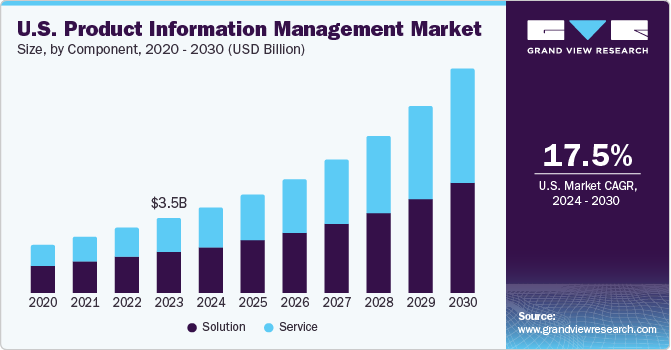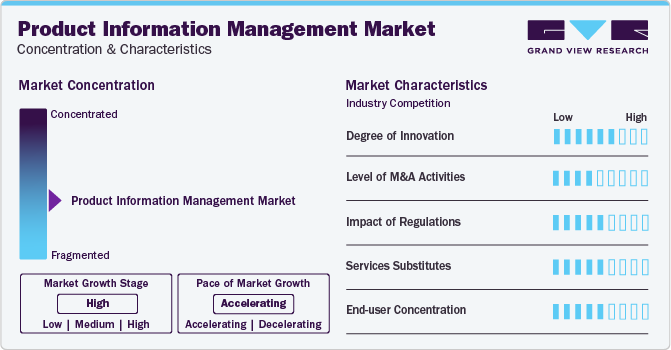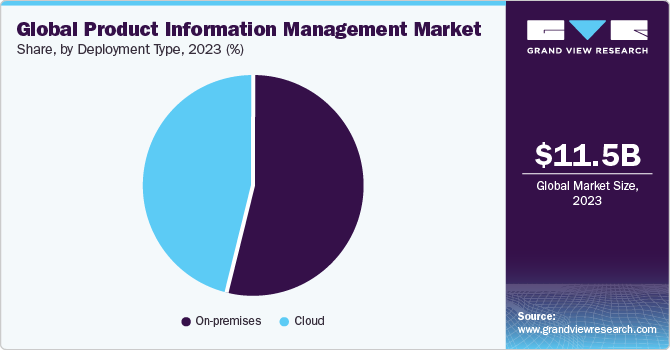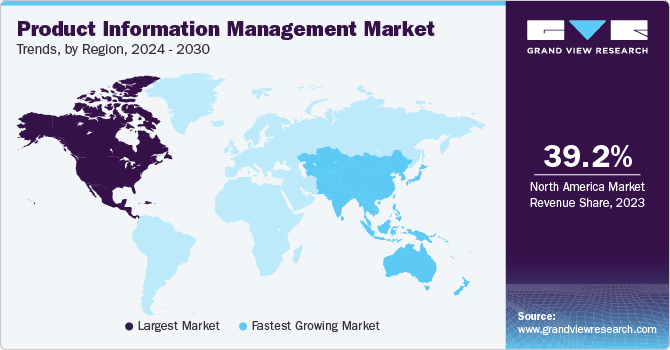
Product Information Management Market Size, Share & Trends Analysis Report By Component (Software, Services), By Organization Size, By Deployment Type, By Industry Vertical, By Region, And Segment Forecasts, 2024 - 2030
- Report ID: GVR-4-68040-248-0
- Number of Report Pages: 140
- Format: PDF
- Historical Range: 2018 - 2022
- Forecast Period: 2024 - 2030
- Industry: Technology
Market Size & Trends
The global product information management market size was estimated at USD 11.49 billion in 2023 and is projected to grow at a CAGR of 16.7% from 2024 to 2030. The increasing need to boost team productivity, data syndication, and managing product data, as well as the thriving e-commerce industry, is expected to drive the market growth. Moreover, the increasing investment in the technological advancements is also driving the market growth.

Product information management (PIM) is the process of enriching and managing product information and related digital assets across the different teams to provide an engaging product experience and sell products across multiple marketing and sales channels. It is a centralized hub where businesses can store, enhance, and transfer product data to ensure consistency, accuracy, and relevance across all touchpoints. PIM systems are designed to handle large volumes of product information, including specifications, descriptions, images, pricing, and other relevant details. PIM aims to streamline product data management throughout its lifecycle, from creation and enrichment to distribution and maintenance. By consolidating product information into a single storage, businesses can avoid data transfer and ensure all stakeholders can access the most up-to-date and accurate information. This centralized approach facilitates collaboration among teams involved in product management, marketing, sales, and e-commerce.
The rapid expansion of e-commerce is one of the significant factors driving the growth of the market. As more consumers turn to online shopping platforms for their purchasing needs, businesses are under increasing pressure to provide accurate, comprehensive, and engaging product information across various digital channels. In the highly competitive e-commerce landscape, having high-quality product data is essential for attracting and retaining customers. According to the Census Bureau of the Department of Commerce statistics, U.S. retail e-commerce sales increased 2.3% from Q2 to Q3 2023.
E-commerce platforms rely heavily on product information to drive sales and enhance the shopping experience. Detailed product descriptions, images, videos, customer reviews, and other relevant content are crucial in helping consumers make informed purchasing decisions. PIM solutions serve as centralized hubs where businesses can efficiently manage and enhance this vast amount of product data. E-commerce platforms rely heavily on product information to drive sales and improve the shopping experience. Detailed product descriptions, images, videos, customer reviews, and other relevant content are crucial in helping consumers make informed purchasing decisions. PIM solutions serve as centralized hubs where businesses can efficiently manage and enhance this vast amount of product data.
Market Concentration & Characteristics
The market growth stage is high, and the pace is accelerating. A growing emphasis on omnichannel capabilities characterizes the market. As businesses strive to deliver consistent and personalized product experiences across multiple sales and marketing channels, PIM solutions are evolving to accommodate the complexities of omnichannel commerce.

The market has a fragmented nature, featuring several global and regional players. The market players are investing in research & development (R&D) to develop advanced solutions and gain a competitive edge in the market. Moreover, they are entering into partnerships and mergers & acquisitions as the market is characterized by innovation, disruption, and rapid change.
In February 2024, Salsify, a Product Experience Management (PXM) platform, launched Salsify PXM Advance, an upgraded version of its Product Experience Management (PXM) platform. This launch enables enhancements in artificial intelligence and automation, efficiency in governance and syndication, and improved content features to boost conversion rates. It also launched the Salsify PXM App Center, serving as a hub for PXM innovations from Salsify and its worldwide network of partners.
Component Insights
Based on components, the solution segment led the market with the largest revenue share of 56.8% in 2023 and is expected to grow at the fastest CAGR over the forecast period. The rise of data-driven decision-making is driving increased investment in PIM solutions. Businesses recognize the value of leveraging product data to gain insights into customer preferences, market trends, and sales performance. PIM platforms offer advanced analytics and reporting capabilities, enabling businesses to extract actionable insights from their product data and optimize their marketing and sales strategies accordingly.
The service segment is anticipated to witness at the fastest CAGR during the forecast period. The complexity of product information management requirements is one of the significant factors driving the segment's growth. As companies expand their product offerings, enter new markets, and embrace omnichannel strategies, they often require specialized expertise and support to implement and optimize PIM solutions. PIM services providers offer a range of consulting, implementation, customization, and integration services to help businesses navigate these complexities and maximize the value of their PIM investments.
Organization Size Insights
Based on organization size, the large enterprises segment held the largest revenue share in 2023. Large organizations often operate across multiple divisions, regions, and channels, resulting in disparate systems and processes for managing product information. PIM solutions provide a centralized platform where organizations can consolidate and standardize product data, ensuring enterprise consistency, accuracy, and compliance. In addition, the globalization of markets is driving the demand for PIM solutions in large organizations. As multinational corporations expand their operations into new regions and target diverse customer segments, they must navigate varying regulatory requirements, languages, currencies, and cultural preferences. PIM solutions offer the flexibility and scalability needed to manage and customize product information for different markets while ensuring compliance with local regulations and maintaining brand consistency.
The small & medium enterprises (SMEs) segment is expected to witness at the fastest CAGR during the forecast period. The increasing importance of e-commerce for SMEs drives the growth of PIM solutions. As more SMEs recognize the potential of online sales channels to reach new customers and expand their market presence, effective product data management becomes essential. PIM solutions provide SMEs with the tools to centralize, organize, and enrich their product information, enabling them to compete effectively in the digital marketplace.
Deployment Type Insights
Based on deployment type, the on-premise segment led the market with the largest revenue share of 54.2% in 2023 and is projected to grow at a significant CAGR over the forecast period. Customization and control of PIM solutions are important factors driving on-premise PIM solutions. Organizations may have unique business processes, workflows, or integration requirements that cloud-based solutions cannot easily accommodate. By deploying PIM on-premise, businesses can customize the solution to their specific needs and integrate it seamlessly with other systems and applications, giving them greater control over their data and processes.

The cloud segment is expected to witness at the fastest CAGR during the forecast period. The accessibility and convenience of cloud deployment are driving its adoption in PIM. Cloud-based PIM solutions can be accessed from anywhere with an internet connection, enabling remote collaboration and seamless communication among teams scattered across different locations. This accessibility empowers businesses to streamline their workflows, improve productivity, and accelerate time-to-market for new products and updates, as teams can collaborate in real time and access the latest product information from any device.
Industry Vertical Insights
Based on industry vertical, the retail segment dominated the market in 2023 and is projected to grow at a significant CAGR over the forecast period. The increasing complexity of product assortments and SKU expansion drives the need for robust PIM solutions in the retail industry. Retailers often deal with vast product catalogs comprising thousands or even millions of SKUs, each with different attributes, variations, and specifications. Managing and organizing this data manually can be time-consuming and error-prone, leading to inconsistencies and inefficiencies. PIM solutions automate and streamline product data management processes, allowing retailers to handle large volumes of product data more efficiently and effectively, thereby improving operational efficiency and reducing time-to-market for new products.
The telecom & IT segment is expected to grow at the significant CAGR during the forecast period. The growing emphasis on customer experience and personalization drives the adoption of PIM solutions in the Telecom & IT industry. With increasing competition and high customer expectations, Telecom & IT companies are trying to deliver personalized and engaging product experiences across multiple channels. PIM solutions enable these organizations to enrich their product data with multimedia content, technical specifications, and customer reviews, creating compelling experiences that resonate with consumers and drive brand commitment.
Regional Insights
North America dominated the product information management market with the largest revenue share of 39.2% in 2023. The regional growth is attributed to the increasing e-commerce market in the region. As online shopping continues to gain popularity among consumers, businesses are trying to deliver accurate, consistent, and engaging product information across various digital channels. PIM offers a centralized platform for managing and enriching product data, enabling businesses in the region to meet the demands of the rapidly growing e-commerce sector and stay competitive in the digital marketplace.

U.S. Product Information Management Market Trends
The product information management market in U.S. is expected to grow at the fastest CAGR of 17.5% during the forecast period. It is attributed to the increasing reliance of businesses on data to make their strategies and growth, with the need for accurate, reliable, and accessible product information becoming essential. Additionally, the U.S. accounted for over 30% of the global market in 2023 and is expected to grow at the significant CAGR over the forecast period.
Europe Product Information Management Market Trends
The product information management market in Europe was identified as a lucrative region in this industry due to stringent data privacy regulations. The businesses in the region are required to ensure the security, integrity, and privacy of customer data, including product-related data. PIM solutions offer robust data governance and security features that enable businesses to comply with these regulations, mitigating the risk of penalties for non-compliance and safeguarding consumer trust and confidence in their brands.
The UK product information management market is expected to grow at the significant CAGR over the forecast period, due to the growing emphasis on sustainability, particularly in fashion, retail, and consumer goods. The consumers in the region are increasingly concerned about the environmental and social impact of the products they purchase, driving demand for transparency and traceability in supply chains. PIM solutions enable businesses to track and communicate information about product origins, materials, and manufacturing processes, empowering consumers to make informed choices aligned with their values and preferences.
The product information management market in German is expected to grow at the fastest CAGR over the forecast period. Germany is a leading hub for manufacturing and industrial innovation, driving the growth of PIM solutions. With many companies operating in sectors such as automotive, machinery, electronics, and engineering, there is a growing need for efficient management of complex product data, thus driving the need for product information management solutions in the country.
Asia Pacific Product Information Management Market Trends
The product information management market in Asia Pacific is anticipated to grow at the fastest CAGR of 19.5% during the forecast period. The growing emphasis on digital transformation and technological innovation drives the adoption of PIM solutions in the Asia Pacific region. As businesses across various industries embrace digital technologies such as AI, IoT, and big data analytics, there is a need for efficient management of product data to support data-driven decision-making and enhance customer experiences. PIM platforms that offer advanced features such as AI-powered content recommendations, IoT data integration, and real-time analytics enable businesses in the region to leverage data effectively and stay ahead of the curve in the rapidly evolving digital economy.
The China product information management market is expected to grow at a significant CAGR over the forecast period, owing to the expansion of cross-border trade. As businesses in the region expand their reach to international markets, they encounter challenges related to language barriers, cultural differences, and varying regulatory requirements. PIM platforms offer multilingual support, localization, and compliance management, enabling regional companies to customize product information for different markets and navigate the complexities of cross-border trade more effectively.
The product information management market in India is expected to grow at the significant CAGR over the forecast period, due to the country's diverse and dynamic retail landscape. With a mix of traditional brick-and-mortar stores, e-commerce platforms, and mobile apps, Indian retailers face the challenge of managing a wide range of products across different channels, thus driving the market growth in the country.
Middle East & Africa Product Information Management Market Trends
The product information management market in Middle East & Africa is expected to grow at the fastest CAGR over the forecast period. The shift towards digital transformation and the adoption of cloud-based technologies drive market growth in the Middle East & Africa. As organizations modernize their IT infrastructure and adopt digital technologies, there is a growing recognition of the benefits of cloud-based product information management solutions in terms of scalability, flexibility, and cost-effectiveness. Cloud-based product information management solutions offer organizations in the MEA region the agility to adapt to changing business needs, scale resources on demand, and access advanced features and functionalities without the need for significant upfront investment in hardware or infrastructure, driving adoption and market growth.
The UAE product information management market is expected to grow at the significant CAGR over the forecast period. UAE's multicultural and diverse population drives the demand for PIM solutions that support multilingual and multicultural capabilities. With residents and visitors from around the world, businesses in the UAE must cater to a wide range of language preferences, cultural nuances, and regulatory requirements, thus creating demand for the market growth in the country.
Key Product Information Management Company Insights
Some of the key players operating in the market include Oracle; SAP; IBM; and Informtica
-
Oracle Corporation is a multinational computer technology company that provides products and services to address enterprise information technology environments worldwide. The company offers cloud-based solutions, including Infrastructure-as-a-Service (IaaS) and Software-as-a-Service (SaaS), database and middleware, application, cloud infrastructure, and hardware systems. Oracle's core application software is a suite of enterprise software products, such as human capital management software, product information management solutions, customer relationship management software, enterprise resource planning software, enterprise performance management software, and supply chain management software
-
SAP SE is a multinational software corporation providing enterprise software and services to businesses of various sizes. The company offers various solutions, including intelligent technologies, product information management, customer relationship management, analytics, human resources, enterprise resource planning and financial management, digital supply chain, and customer experience. SAP operates in Europe, Africa, the Americas, the Middle East, and Asia-Pacific, serving clients in consumer products, oil, gas, energy, financial services, aerospace and defense, transportation, and logistics
Pimcore, Akeneo are some of the other market participants in the global market.
-
Pimcore is an open-source enterprise software platform that offers a comprehensive solution for product information management, customer data management, master data management, digital asset management, content management, and digital commerce. The platform is built on PHP and MySQL/MariaDB and is extensible through third-party components and plugins. Pimcore is a modular software architecture that utilizes leading development frameworks, such as Symfony and Twig, and follows the specifications and definitions of the PHP Framework Interop Group
-
Akeneo is a Product Experience company specializing in Product Information Management (PIM) solutions, helping organizations deliver engaging, enriched, consistent, and compelling product experiences across all owned and unowned channels. The company's flagship product, Akeneo Product Cloud, is a composable SaaS-based solution for activating, orchestrating, and innovating product information
Key Product Information Management Companies:
The following are the leading companies in the product information management market. These companies collectively hold the largest market share and dictate industry trends.
- Oracle
- SAP
- IBM
- Informtica
- Pimcore
- Akeneo
- Winshuttle
- Riversand
- Salsify
- Aprimo
Recent Developments
-
In November 2022, Propel Software launched product information management (PIM) as its solution. The solution seamlessly provides customers with precise, customized product information through every sales channel by linking manufacturing and marketing teams with a consistent, reliable product database. It propels the facilitation of seizing new product launches promptly and capitalizing on emerging market prospects swiftly
-
In April 2023, Image Relay launched a single source product information and digital assets solution, Marketing Delivery. The new cloud-based solution integrates and expands upon digital asset management (DAM) and product information management (PIM) functionalities to empower organizations to organize, link, oversee, and communicate all digital assets and product information quickly, seamlessly, and precisely
Product Information Management Market Report Scope
|
Report Attribute |
Details |
|
Market size value in 2024 |
USD 13.03 billion |
|
Revenue forecast in 2030 |
USD 32.84 billion |
|
Growth rate |
CAGR of 16.7% from 2024 to 2030 |
|
Base year for estimation |
2023 |
|
Historical data |
2018 - 2022 |
|
Forecast period |
2024 - 2030 |
|
Quantitative units |
Revenue in USD million/billion and CAGR from 2024 to 2030 |
|
Report coverage |
Revenue forecast, company ranking, competitive landscape, growth factors, and trends |
|
Segments covered |
Component, organization size, deployment type, industry vertical, and region |
|
Regional scope |
North America; Europe; Asia Pacific; Latin America; MEA |
|
Country scope |
U.S.; Canada; UK; Germany; France; Italy; China; India; Japan; Australia; South Korea; Brazil; Mexico; Argentina; UAE; Saudi Arabia; South Africa |
|
Key companies profiled |
Oracle; SAP; IBM; Informtica; Pimcore; Akeneo; Winshuttle; Riversand; Salsify; Aprimo |
|
Customization scope |
Free report customization (equivalent up to 8 analyst’s working days) with purchase. Addition or alteration to country, regional, and segment scope |
|
Pricing and purchase options |
Avail customized purchase options to meet your exact research needs. Explore purchase options |
Global Product Information Management Market Report Segmentation
This report forecasts revenue growth at global, regional, and country levels and provides an analysis of the latest industry trends in each of the sub-segments from 2018 to 2030. For this report, Grand View Research has segmented the global product information management market research report based on the component, organization size, deployment type, industry vertical, and region:
-
Component Outlook (Revenue, USD Million, 2018 - 2030)
-
Service
-
Solution
-
-
Organization Size Outlook (Revenue, USD Million, 2018 - 2030)
-
Large Enterprises
-
Small & Medium Enterprises (SMEs)
-
-
Deployment Type Outlook (Revenue, USD Million, 2018 - 2030)
-
On-premises
-
Cloud
-
-
Industry Vertical Outlook (Revenue, USD Million, 2018 - 2030)
-
BFSI
-
Retail
-
Manufacturing
-
Telecom & IT
-
Media & Entertainment
-
Other
-
-
Regional Outlook (Revenue, USD Million, 2018 - 2030)
-
North America
-
U.S.
-
Canada
-
-
Europe
-
UK
-
Germany
-
Italy
-
France
-
-
Asia Pacific
-
China
-
India
-
Japan
-
South Korea
-
Australia
-
-
Latin America
-
Brazil
-
Mexico
-
Argentina
-
-
Middle East & Africa
-
UAE
-
Saudi Arabia
-
South Africa
-
-
Frequently Asked Questions About This Report
b. The global product information management market size was estimated at USD 11.49 billion in 2023 and is expected to reach USD 13.03 billion by 2024
b. The global product information management market is expected to grow at a compound annual growth rate of 16.7% from 2024 to 2030 to reach USD 32.84 billion by 2030
b. North America dominated the market with a revenue share of 39.2% in 2023. The regional growth is attributed to the increasing e-commerce market in the region. As online shopping continues to gain popularity among consumers, businesses are trying to deliver accurate, consistent, and engaging product information across various digital channels.
b. Some key players operating in the product information management market include Oracle; SAP; IBM; Informtica; Pimcore; Akeneo; Winshuttle; Riversand; Salsify; Aprimo
b. The increasing need to boost team productivity, data syndication, and managing product data, as well as the thriving eCommerce industry, is expected to drive the growth of the product information management market.
We are committed towards customer satisfaction, and quality service.
"The quality of research they have done for us has been excellent."




